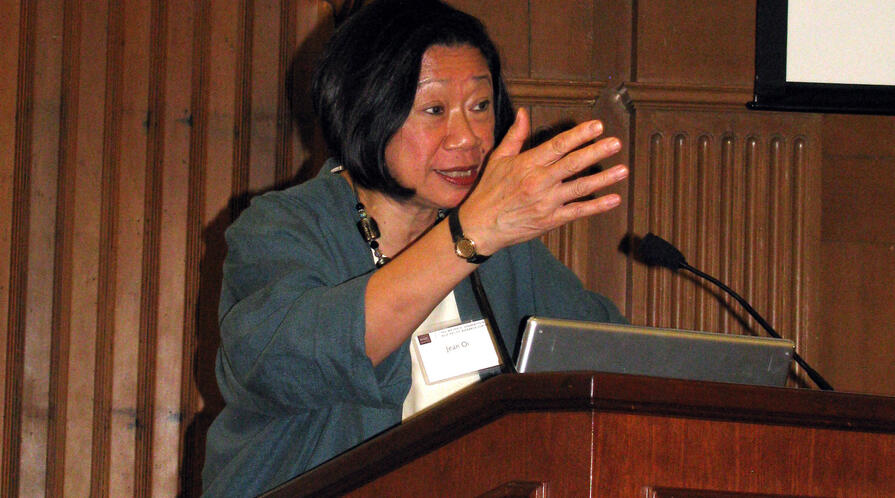Students learn through assignments based on real global events
Imagine you are on the staff of the National Security Council (NSC) and a naval dispute breaks out on the Korean Peninsula while you are at home celebrating Thanksgiving. You have just three hours to prepare a detailed memorandum summarizing the situation and offering recommendations for how the United States should respond.
This is a major responsibility with a large number of interrelated issues that must be taken into account—how would you proceed?
Stanford students in the winter quarter course U.S. Policy toward Northeast Asia (IPS 244) had the opportunity to step into the challenging role of the NSC senior director for Asia and consider such a security situation. They wrote and presented memoranda on this and an East Asia trade crisis scenario in class, as well as a final memorandum to the president proposing a China policy for his second term. The assignments required students to consider a wide range of global, regional, and domestic factors—many pulled directly from current global events.
Each member of the team of Shorenstein Asia-Pacific Research Center (Shorenstein APARC) Asia experts teaching the course drew on decades of related expertise to write the scenarios.
- Michael H. Armacost, the Center’s Shorenstein Distinguished Fellow, previously served on the NSC, in the Defense Department, as U.S. ambassador to the Philippines and Japan, and as undersecretary of state for political affairs.
- Shorenstein APARC associate director for research Daniel C. Sneider, an Asia history expert, spent over 30 years as a journalist reporting on international affairs and security issues, including working as a foreign correspondent in Japan, Korea, India, and Russia.
- David Straub, associate director of Stanford’s Korean Studies Program, is a former State Department official with long-time expertise in U.S.-Korea relations and North Korea, including participation in the Six-Party Talks on North Korea’s nuclear program.
- Thomas Fingar, FSI’s Oksenberg-Rohlen Distinguished Fellow, is a China expert and has previously held numerous key U.S. intelligence posts, most recently as the first deputy director of national intelligence for analysis and, concurrently, as chairman of the National Intelligence Council. He also served as assistant secretary of the State Department’s Bureau of Intelligence and Research.
In the first assignment, students read about a proposed China-Japan-South Korea free trade agreement (FTA). Navigating through a web of regional and domestic issues, they advised on how the United States should respond to an appeal from Japan for certain trade concessions in exchange for its backing out of the FTA. The assignment described complex economic and political conditions in May 2013 after elections in the United States, South Korea, and Japan, and a leadership transition in China. The U.S.-Japan alliance was one of many key factors students took into account.
“It was my great pleasure to participate in this class—it truly broadened my views of U.S. foreign policy toward Northeast Asia. The substantive knowledge presented by both instructors and students during the class will undoubtedly contribute to a much safer, more peaceful, and unified world.”
-Heeyoung Kwon, Visiting Scholar, Korea Foundation
The next memorandum assignment described an inter-Korean naval dispute falling in the crucial weeks between the 2012 U.S. and South Korean presidential elections. It narrated the economic and political situation of each country in precise detail, and set the stage for the dispute with real-life events like the 2010 sinking of the South Korean navy ship the Cheonan. Students were asked to consider the possible role China could play in mediating with North Korea, and how U.S. tensions with Iran could limit its involvement in negotiations.
“In IPS 244…no conversation is irrelevant to current events in Northeast Asia…The memo assignments…are so detailed, so current, and so realistic, that even a seasoned diplomat would be challenged by them—I know this because there are seasoned diplomats taking the class.”
-Jeffrey Stern, MA Student, International Studies Program
Shorenstein APARC offers U.S. Policy toward Northeast Asia each winter quarter. The diverse mix of students, combined with the “in-the-field” expertise of the instructors, creates a lively and challenging class environment. IPS 244 goes beyond a traditional academic course to create assignments based on real-life events and global conditions, and place students in the position of thinking like a government official. For the many of them that will go on to pursue government careers, the course serves as an important first-step in training for “scenarios” very similar to those they address in class.





